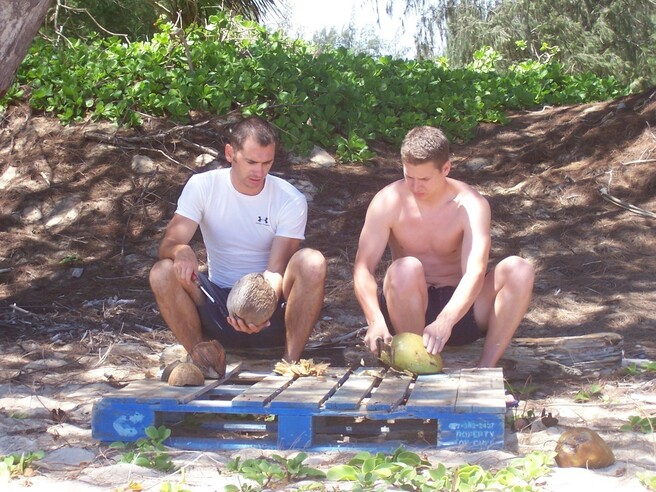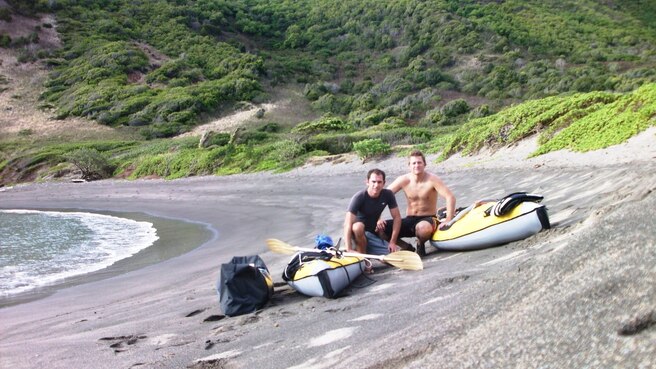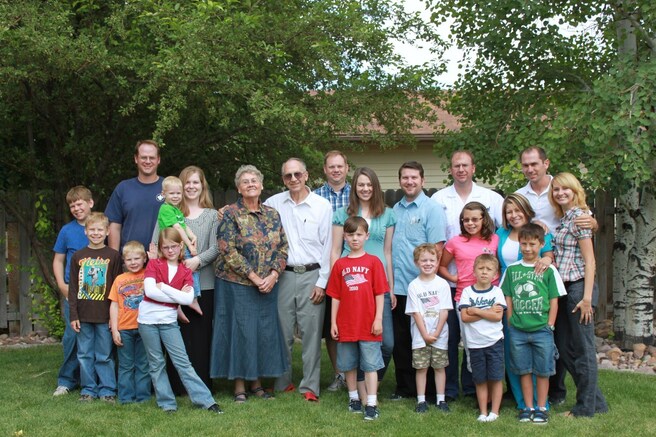Brothers and Sisters, I am humbled and honored to remember Heber with all of you today.
For those who don’t know who I am, my name is Eric Phillips, one of Heber’s friends here in Hawaii. I’ve actually only known Heber for 5 years. I was shocked by how small that number is. Only five years? Many of you, I’m sure, have known him much, much longer. And for that, I am envious. For I wish I’d known Heber much, much longer. It certainly felt like I did. It always felt like our relationship stretched far beyond this life alone. Which may explain why, in the past few days, I have had a hard time pinpointing the exact moment I first met Heber. Most of you can appreciate how strange that is—not to remember the first time you met Heber Moulton because—well, he certainly leaves an impression. Heber Moulton has no match. No pair. No mold from which he comes. He doesn’t disappear in a crowd. He is uniquely, unique.
My hope today, is to remember with you, just how unique Heber is.
And I do mean is. Not was. Because Heber lives. Not just in memory. True, he is separated from his body. But only temporarily. In the meantime, his spirit lives. And according to the prophets of God, most specifically Alma in his 41st chapter, right now Heber still possesses the same characteristics and traits we all came to love. The same qualities, habits, humor…even his quirks…they’re all the same.
My dad shared a metaphor with me that speaks of Heber’s unchanging nature. It reads:
“I am standing upon the seashore. A ship at my side spreads her white sails to the morning breeze and starts for the blue ocean. She is an object of beauty and strength. I stand and watch her until at length she hangs like a speck of white cloud just where the sea and sky mingle.
Then someone at my side says: “There, she is gone.”
“Gone where?”
“Gone from my sight. That is all.”
You see, She is just as large in mast and hull and spar as when she left my side and she is just as able to bear her load of living freight to her destined port. Her diminished size is in me—not in her. And just at that moment when someone says “There, she is gone” there are other eyes watching her coming, and other voices ready to take up the glad shout—
“Here she comes!”
Yes. Heber is the same Uncle Heber my son idolizes. The same Heber I idolize. Which is why I will speak of him today in the present tense.
On Tuesday night, my wife and I were trying to figure out why we love Heber so much. Especially why I love him so much. We started listing off our favorite traits. The adjectives came easy and often, as I’m sure they have for you during the past few days. Here are a few of my favorite Heber qualities.
First, his unmatched “resourcefulness.” The Master Recycler. Did you know what Heber used as a dive knife for at least 2 years? A steak knife, carried in a homemade sheath made of duct tape. His dive weights, until only a few years ago, were rocks found on the cliffs that he’d fasten to himself with an artwork of string and netting. When the two of us kayaked the North Shore of Molokai, rather than spend $80 for a paddle, Heber bought two $8 single-blade paddles and duct taped them together. I made fun of his paddle, but in the water, I was the one always trailing behind. Or how about his birthday cards? Heber’ll take ones that people give him, cross out his name, put theirs instead, and give it right back to them on their birthday. Anyone who’s received one of those cards will tell you they are the funniest cards ever. To cut down on his grocery bill, Heber cleared, then planted a garden on the side of one of the nearby mountains. Or how about his dumpster to Craigslist racket? Heber learned that at the end of the school year, the wealthy Japanese students at UH throw away their stuff, much of which is in great shape. Heber had no shame. He’d go get it, then sell it on Craigslist. Only Olya knows how many thousands of dollars worth. And then there’s the miracle of his bikes. Heber never buys a bike, but always has a nice one. He even found a way to score a free Mac computer—the same model I shelled out thousands for. And look at the pictures of he and Olya’s travels on the Internet. Heber’s a student/researcher—Now I realize that within the next six months that status was changing and he was about to get paid very well, but since I’ve known him, his job—in terms of pay—has basically been glorified slavery. Yet Heber and Olya have gone everywhere: China, Paris, Belgium, Moscow, Mexico, East Coast, every Hawaiian island dozens of times, the list easily eclipses that of people who make 10 times more.
I remember one story that really sums up his resourcefulness. We’d just come ashore from spear fishing and some fellow, very expensively equipped divers made light of Heber’s minimalist appearance. Never one for conflict, Heber walked away, then turned to me and held up his fish. “But my fish is bigger than theirs, isn’t it.”
And it was. And that’s the point. Heber never lets something like lack of equipment keep him from getting his fish, or getting a Ph.D., or getting a beautiful, talented, and unbelievably kind wife. Heber is incapable of seeing obstacles. He only sees challenges. And he always makes those challenges fun.
Which brings me to my next favorite Heber quality, and really the one that got me hooked on Heber. Fun. Heber is singularly focused on having a good time. His appetite for fun is never ending. But it’s not relaxed fun. Heber’s brand of fun is what I call “sustainable fun.” Hang out with Heber for a while, and you’ll have a thrill you will never forget. An experience you can relive in your mind over and over. His idea of fun is not three hours watching a football game. I tried that once, but Heber made clear that TV is his arch nemesis. Watching other people’s lives? “SO STUPID!” he’ll say, in his unique Texas-Russian-Local kine’ accent. Heber doesn’t want to watch. He wants to participate. He wants to be the one swimming with the whale. The one surviving for five days in the jungle with nothing but a spear and handful of rice. Heber’s brand of fun is a 10-hr hike to the highest peak on the island. In flip-flops. Heber’s brand of fun is spraying the local green parrots with a water hose for an hour straight to the eternal delight of my 4-year-old. Heber’s brand of fun is karaoke, and beach bonfires with friends. It’s being the life of a 3-yr-old’s birthday party—my wife and I decided long ago that the only entertainment needed for our children’s birthday parties is Heber. Heber’s brand of fun is the same, simple brand of fun we all loved when we were little, but maybe forgot about when we became too distracted by the petty concerns of adulthood. Heber’s brand of fun is superior.
Proof of its superiority came this past Christmas. I spent a healthy chunk on gifts for my son. Playstation games. Action figures. Plastic swords. But you know what toy he was playing with Christmas night? What toy he slept with for several nights afterward? A slinky his Uncle Heber got him at the .99 cent store. Heber wasn’t being cheap. He was thinking what kind of toy he’d personally want to play with. Something that all at once fascinated, entertained and involved him. It was the perfect gift.
And it was always the perfect when it came from Heber because it was always thoughtful, which brings me to the next quality of Heber’s I admire. His kindness. There are many synonyms for this trait: nice, caring, gentle, considerate, but the bottom line is, Heber puts others first, often when he has no business doing so. I speculate that he adopted a good portion of this trait from Olya, without a question the most selfless person I’ve ever known. But nonetheless, in the time I’ve known Heber, he is always doing for others. My first memory of him doing this was when he took a day off work several years ago to escort me and some out of town friends to a dive spot where they were guaranteed to see sharks. The cliffy spot was such that, once in the water, there was no way out for another 30 minutes with the current down the coastline. The water was rough, and five minutes after entering, my two friends began to vomit. I knew Heber wanted to stay out. He wanted to spear fish, chase turtles…y’know, do his thing. He’d missed work so he could do his thing. So he described for them how to get to the spot where they could get out 30 minutes away. But when he saw the worry in their eyes, he escorted them, vomit and all, 30 minutes to a safe exit point. Because of the strong current, that was the end of Heber’s dive, and yet he didn’t show a hint of annoyance. He never does. At least not in front of me. Yet he does things all the time for others at his own expense. Be it at church, school, or wherever. In fact, one of the last things Heber did during his lifetime, was drop everything he was doing last Friday, drive to my house in Kapolei, go in and find some documents we needed, and ship them to us in DC at a very high cost.
I realize many of us do things for others. That’s clearly evident today by your outpouring of love and support to Heber’s family and friends. But—at least for me—what makes Heber’s brand of kindness so special is that he genuinely never expects anything in return. Quid pro quo is a foreign and offensive concept to him. I’m not just saying this. I know this, because we’ve talked about this very topic. This doesn’t mean Heber gets taken advantage of easily. In fact, Heber is very wary of those kind of situations. But once Heber believes someone is in real need, or if he believes God—or Olya—want him to help someone, he’ll bend over backwards. After that, the matter is closed. Heber loathes social debts or obligations. Nothing between people, in his opinion, should be forced.
I remember one time he cleaned my inflatable kayak for me, which is a pain and takes about 45 minutes. I told him I’d pay for lunch in return.
“Nah. No need,” he said.
I argued that there was a need, that’d it make me feel less guilty. For some reason, this hit a nerve of his, and he went off on a rare diatribe about how I should just say thank you.
“If you give me something for being nice, then I’m not being nice anymore,” he explained. It was typical Heber logic. Sound, simple, almost mathematical. And totally accurate. Getting something in return for being kind would ruin the purity of his intent.
Which brings me to the final quality of Heber’s that I admire. The quality of his that I most hope to emulate—Heber’s purity. Heber never has a secret agenda or a hidden motive. If he does or says something, it’s because he wants to. Simple as that. Free from complex calculations that many adults make in hopes of maximizing their own interests. In this way, Heber is almost childlike, and maybe that’s why my son loves him so much and so easily. Because my son recognizes in Heber safety. What you see, is what you get. There’s no under current of deceit.
But do not confuse Heber’s purity with being a simpleton, as I think I may have done at first. Heber understands the complex plots that muddy the waters of humanity. He just chooses to swim in cleaner waters. It really wasn’t until our weeklong man trip to Molokai that I fully understood this. That I realized just how smart and aware Heber is. We didn’t see any other human for five days, and while Heber may be fine with a weeklong of silence, I am less so. So eventually I pushed our talks deeper and more personal. I learned Heber’s views on politics, faith, and love. They are not simple views. For example, Heber believes that God lives, that his son Jesus Christ atoned for our sins; that Joseph Smith saw the both, and through their power, translated the Book of Mormon and restored their gospel. Heber does not believe these things because his mom and dad told him it is so. Or because it’s easier on his marriage. Or because being Mormon gives him an automatic circle of friends. No. Those reasons would not be sufficient for Heber Moulton. Too calculated. Too impure. He would not keep the commandments as strictly and purely as he does—he definitely wouldn’t choose church over the ocean on Sundays—if his testimony’s roots were shallow. No. Heber follows Christ because he has had multiple spiritual confirmations that doing so will bring him eternal happiness. Many of those experiences happened on his mission, but they have occurred since as well, including through service here at McCully Ward. Heber’s testimony is born of epiphanies of truth and miracles that he cannot explain away by earthly rationales.
Heber genuinely believes that only through this gospel, and its many rules and regulations—and let’s be honest, Heber’s not a fan of rules and regulations—but he follows God’s because he knows that’s the only way he will be able to be with his Olya forever. And that—friends and family—is far and away Heber’s main goal: to be with his Olya for eternity.
He loves her so much. She is the only person that can tame him. Get him to wear clothes that don’t come from a thrift store. Get him to come down from a coconut tree or spend $10 on a movie. Heber is obsessed with making the most practical and logical choice possible. We all know this. But he will bend. But only for two people. God and Olya. On that same trip to Molokai, he told me that he felt he married way above himself, and even admitted that he still wakes up surprised that Olya actually said yes.
Olya, you will see Heber again and live as husband and wife for eternity. I do not say this lightly. Many of us married couples will not be worthy. But I know you are. And I know Heber is.
I know because it says so in the scriptures.
Ps. 24:3 & 4 reads:
3.Who shall ascend into the hill of the Lord? Or who shall stand in his holy place?
Verse 4 answers: He that hath clean hands and a pure heart; who hath not lifted up his soul unto vanity, nor sworn deceitfully.
The author of those words, David, might as well have written Heber’s name for verse 4, because it describes him perfectly. Clean hands. A pure heart. Not vain. Not deceitful. That is Heber Moulton.
Christ also confirmed Heber’s eternal exaltation in his beatitudes, when he said in Matt. 5:8:
8. “Blessed are the pure in heart; for they shall see God.”
I know of no other adult as pure in heart as Heber.
I admit, though, that right now, the pain of being away from Heber eclipses the comfort those scripture bring. Of knowing that we can be together again in the eternities.
This week a relative shared a wonderful quote by Neal A. Maxwell that I want to close with because it really helped me understand this pain. Why, physically and spiritually, death hurts those it leaves behind. He said:
“Eventually, the veil that now encloses us will be no more. Neither will time. (D&C 84:100.) Time is clearly not our natural dimension. Thus it is that we are never really at home in time. Alternately, we find ourselves wishing to hasten the passage of time or to hold back the dawn. We can do neither, of course, but whereas the fish is at home in water, we are clearly not at home in time--because we belong to eternity. Time, as much as any one thing, whispers to us that we are strangers here.” (All These Things Shall Give Thee Experience, p. 11)
And so, brothers and sisters, Heber, unlike us, is back where he belongs in an eternal state, while we must linger in time. It is our Spirit’s unfamiliarity with this concept of time, of having to wait to be with Heber again, that stings so badly. But the sting will go away. Of this, I am certain.
I say these things in the name of He who made that possible, Jesus Christ, amen.




